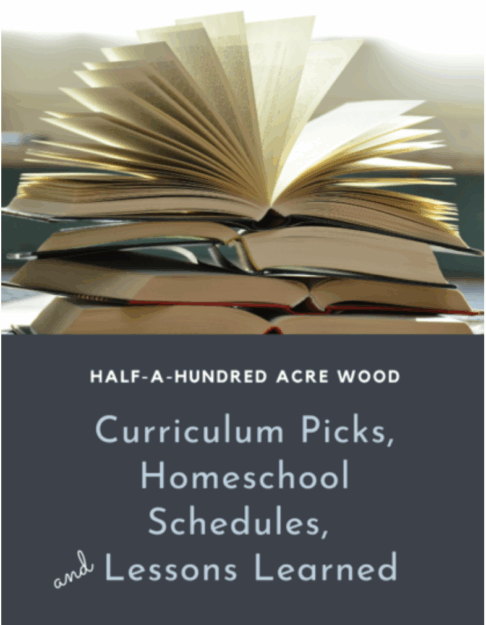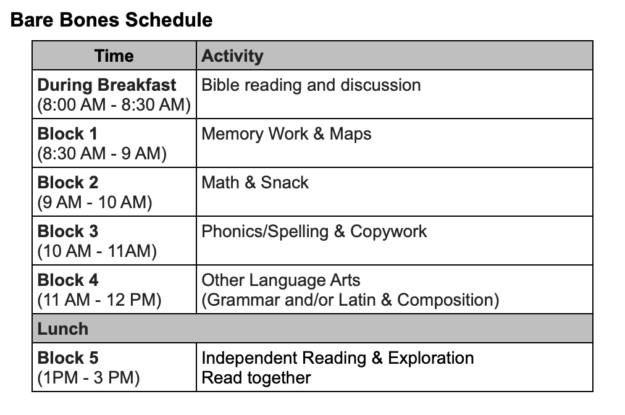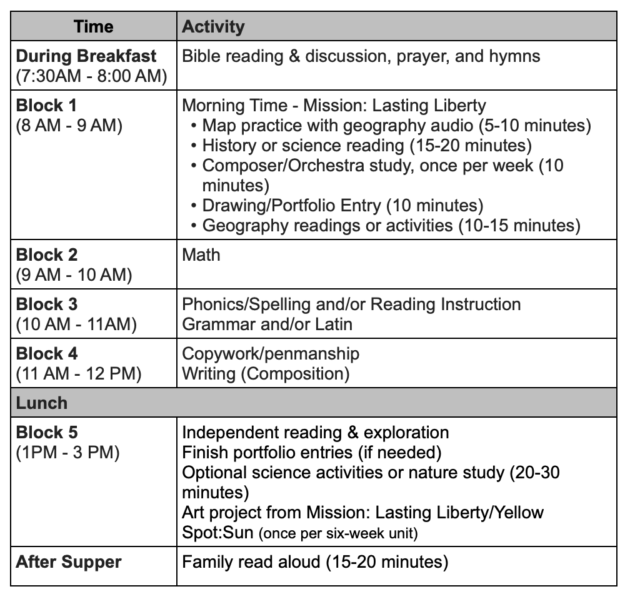
When our eldest son graduated from high school four years ago, I had no idea how much it would shift my priorities and our family dynamic. While it’s been a joy to watch him pursue his post-homeschool educational endeavors (and work in scientific research as an adult), the honest truth is that… when he graduated and left for college, a piece of my heart went with him.
And now, even though I’m still adjusting to not just our first son’s graduation but also to our second son’s graduation (which was a year ago), our third son started trade school this summer. This means the end of another homeschool journey is fast approaching. I have so loved homeschooling each of our boys through high school. It’s exciting to enter into this new chapter of their lives, but man. It’s so hard to let go.
So… in case you’re wondering why it’s been quiet over here, I’m finding it harder and harder to write blog posts and engage on social media and write newsletters because my perspective has shifted so much. Time with my family is just so precious.
Before I share more, I just want you to know… I am a real mom. We are a family who loves to spend time together and aims to love and serve God well. I enjoy writing curriculum and sharing ideas (and my husband is such a good sport about handling shipping, receiving, and customer service), but I am not that mom who has it all together. My ongoing prayer is that what we share here and what our business stands for continues to bless other families. My husband and I are grateful for the opportunity to homeschool our family alongside yours even as our lives shift and transform into a new normal.
Before providing a sneak peek at our schedules and curriculum selections, I wanted to revisit my top lessons learned from our first fifteen years of homeschooling…
Lessons Learned from Fifteen Years of Homeschooling
- Seek first the kingdom of God. Loving God and fellow man (including siblings) takes precedence over everything else.
- Relationship is far more important than curriculum and lesson plans. Get to know your children and their interests. Seek opportunities to encourage them in those interests, but also hold them accountable to do their best in whatever they do.
- Young children operate best with short 15-minute lessons and plenty of time to explore nature and use their hands. (Boys especially struggle with sitting at a desk for long periods of time. We’ve completed our book work on the playground, the trampoline, the patio, sitting upside down in a chair…)
- Reading together provides an opportunity to build your family’s relationships through shared stories and discussion. During family read aloud time, it’s okay if children are using their hands (playing with LEGOs, coloring, etc.). In fact, we’ve found that it’s necessary.
- Give yourself and your children the grace of tapering into the school year, taking breaks when needed, and doing whatever needs to be done in the midst of your real, everyday lives.
- Be prepared, but hold your plans and expectations loosely, for God may have a special unexpected purpose for your family to pursue.
- Focus on learning and character-building rather than grades and test scores (at least until middle or high school).
- Resist falling into the trap of comparison. Comparison is the death of contentment. Do what’s best for your family, regardless of what others say and do.
- Choose joy. Learning can be hard, but it’s also exciting and rewarding. If you’re filled with a sense of dread as you enter a new school year, it’s time to change what you’re doing.
- If you’re new to homeschooling, start simple. Reading, writing, and arithmetic are the foundational skills needed for learning anything. Add in other things to spark curiosity and to learn about God and the world He has given us. When you discover interests and giftings, pursue them!
- Be confident but also recognize that plan doesn’t equal reality. As with starting anything new, it may be a rocky road at first. (Remember, mercy triumphs over judgment!) Pray for guidance, wisdom, and grace, and lay all your efforts at the feet of Jesus. It’s all for Him anyway!
Homeschool Schedules
Let me take you back to when we first started homeschooling. What follows is a bare bones schedule for learning the basics.

This was the schedule we followed until our thirst for more truth, goodness, and beauty prompted us to seek new learning adventures beyond the basics. Over time, our family started to long for the wonder and beauty of music, art, poetry, science, and literature. We discovered the passions of our children and pursued hands-on history studies with our eldest (who has always loved history). Then we felt a genuine desire to make the Great Commission the focus of our learning endeavors. And as our oldest boys became teenagers, we wanted to stay connected in our learning even though they were studying high-school level material. And so our reading plans, blog posts, and schedules morphed over time to look more like this:

This schedule is just a guideline we’ve used in the past. In reality, our homeschool has been more of a juggling act at times. After our morning time (which has consisted of activities we use to jumpstart our school day), our high schoolers would follow a somewhat independent schedule, choosing the order in which they complete assignments. They engaged me in discussions or asked questions as needed. When I was working with our youngest two, their brothers were working on something they could do without my assistance so that they didn’t interrupt — and vice versa.
Curriculum Choices
In years past, I have taken each of our children out individually for a “dessert date” before the school year starts. This was where we set goals and chose curriculum for the year. I’ve loved setting goals with my children, and I’ve loved learning with them. It’s one of the greatest reasons we homeschool. Another reason is learning together, which leads me to…
Family Morning Time
For several years, our family (from our youngest though our oldest) has started together with a common morning time over breakfast. Now that we have one beyond college, one in college, and one halfway in college (via dual enrollment), this just leaves our fourth son and me for morning time.
- For morning time, we’re using the one-year U.S. history/geography curriculum, Mission: Lasting Liberty. This plan includes Bible, U.S. history, hymns, art, music, poetry, geography, science, scripture memorization, and read-alouds. Memory work includes poetry & hymns, U.S. geography, and scripture. This means we skipped Mission Faith Forgers, which was a painful decision for me because it’s my favorite of the three Mission Great Commission curriculum plans. But due to several factors, we ended up jumping over a year which will put our son at the right place in 9th grade for starting Truth Trek One. To make up for the skip, we’ve been reading Trial and Triumph and adding in some of the missionary stories from Mission Faith Forgers.
In the past, our older students were fairly independent in their individual work and just asked questions as they needed my assistance. After morning time, most of my day was spent on teaching writing and math to the youngest ones, discussing literature/philosophy/etc. with the oldest ones, and answering questions as needed. This year, it’s pretty different. Our third son (who is now in 11th grade) is only home two days per week. On those days, he works through Bible, physics, calculus, and English/literature, and we discuss content from each subject, so… let’s start with that.
The High Schooler (11th grade)
Our 11th grader officially needs only a few more credits to graduate (Bible III, English III, and English IV), but he’s taking additional coursework in science and math because it’s a given in our home that our children will take one course from each of the science disciplines (biology, chemistry, and physics) and they will take at least four years of math (one of which he completed in 8th grade). He’s currently working on the mechatronics & industrial maintenance program at the Tennessee College of Applied Technology (aka, trade school) as a dual enrollment student. Here at home, he’s studying the following:
- Physics: Conceptual Physics
- Math: Calculus for Everyone. Read our review.
- Exposition & Composition: Worldviews in Conflict. This literature course compares the Christian worldview to the predominant worldviews students will encounter beyond high school and in popular culture (using the writings of philosophers, literary figures, film, and pop culture) and includes an analysis of influential literary works from Shakespeare’s Macbeth, Hawthorne’s The Scarlet Letter, Twain’s Adventures of Huckleberry Finn, and Hemingway’s The Old Man and the Sea. Other reading & composition will come from philosophy and British literature selections.
- Philosophy: Consequences of Ideas. This is a course that we’re both going through which corresponds nicely with Calculus for Everyone.
- (TCAT coursework towards certification in mechatronics.)
Two of the resources above are part of the Compass Classroom Membership, a monthly subscription option allowing homeschool families access to over 30 courses. You can test drive all the courses for free!
If you’d like to take a look at a scope and sequence for fulfilling history credits, visit this post or check out our Truth Trek series which provides plans that take students through all four years of high school.
The Middle Schooler (6th grade)
This year ushers us into another shift in our homeschool. I already mentioned that our third son has started trade school as a dual enrollment student which means there’s not much he’s doing at home from here on out. Our youngest son started 6th grade last week which means we don’t really have an elementary student anymore. Honestly, I miss using things like All About Reading. (Three of our sons have asked me to keep our All About Reading curriculum, so at least it’s not completely out of our lives. I guess that’ll end up being distributed as part of their inheritance.)
So… here’s what our sixth grader is working on this year:
- History, Science, Drawing/Art, Composer/Orchestra, Geography, and Scripture: Mission: Lasting Liberty.
- Poetry, Bible, and Geography Memory Work. Also Mission: Lasting Liberty
- Math: Math U See Zeta. Math U See has resulted in the best outcome of any math curriculum option we have used in the past – for all of our sons! Most math programs incorporate either too few math problems or too many. This program provides a good balance, incorporating new concept practice and systematic reviews for every lesson. And… because he will start PreAlgebra in 7th grade, he will be capable of completing math through Calculus I in high school if we decide to do so.
- Language arts:
- Spelling: All About Spelling Level 4. We’re still using this program in our family after over a decade. We’ve attempted other spelling programs, but this is the one we have always returned to. You can read more about it here. (Until August 26, enjoy FREE shipping on orders over $100.)
- English Grammar: Fix-It Grammar – Level 4 (15 minutes). We’ll work through these short, simple lessons to reinforce mechanics and editing skills over the course of the year. This is the quickest, most effective way to apply English grammar and mechanics. Read the reasons we love this program so much, and/or try it free here!
- Composition: Writing & Rhetoric Book 5: Refutation & Confirmation. While we often recommend IEW’s theme-based writing lessons or Structure & Style for Students for teaching/learning all types of structures (such as summaries, essays, literature responses, critiques, and stories), our youngest son has a bent towards narrative writing. Writing & Rhetoric provides consistent narration in our homeschool and allows us to work through the classical progymnasmata as he develops his writing abilities. He has learned to write fables, narratives, and 6-paragraph chreia/proverb essays. This year he’s learning refutation and confirmation. Thus far, it’s been a great fit for him! And should we ever need to, we can always return to IEW’s Structure & Style to ensure we’ve covered all the bases.
- Literature selections for independent reading will be posted here. If he had his choice, he would read mostly the fantasy/adventure genre (such as Wingfeather Saga, Guardians of Ga’Hoole, The Mysterious Benedict Society, or Guardians of Childhood). But… we came to an agreement this year which has been working rather well. After he reads two books from our suggested reading list (primarily historical fiction relating to the history we’re studying), he gets to read a book of his choice. We’re two weeks into the school year and he’s already starting his fifth book. (View what he’s read here.) If you have a younger child and are studying American history this year, you may want to checkout selections from the Who Was series, American history leveled readers, and American History Picture Books.
Beyond High School
If you’re looking at college, just know that things are not the same as they were two or three decades ago. Young men with college degrees are now unemployed at the same rate as those who never went to college at all. And this is now occurring even with degrees in STEM-related fields. So… my one piece of advice from having two college students is…
Do NOT take out loans to go to college. It’s not worth it. If you need some convincing, we urge you to watch this video (approx. 1.5 hours).
We’ve been blessed that our oldest sons have gone to college tuition-free due to scholarships (based mainly on their ACT scores). If it had not been tuition free, though, they likely would have all traveled the trade school route. (Actually, I wish our oldest sons had enrolled in a dual enrollment program at trade school to earn certifications/training in a trade prior to graduating from high school. I also wish they had experienced an apprenticeship or, at the very least, some job shadowing. You can learn more about this approach through the Kickstart program.)
That sums up where we are now. If you have any questions about these schedules, about any of our curriculum choices, about college, or about planning in general, feel free to drop down to the comments or send us an email! We’d love to hear from you!
[I am] confident of this very thing, that he which has begun a good work in you will perform it until the day of Jesus Christ: -Philippians 1:6



